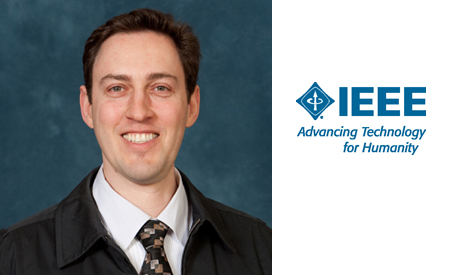Igor Markov Elected Fellow of the IEEE

 Enlarge
Enlarge
Prof. Igor Markov has been named an IEEE Fellow, Class of 2013, “for contributions to optimization methods in electronic design automation.”
Since joining the University of Michigan faculty in 2000, Prof. Markov’s research has included computers that make computers (software and hardware), secure hardware design, combinatorial optimization with applications to the design, verification and debugging of integrated circuits, as well as in quantum logic circuits. New algorithmic techniques developed by Prof. Markov have been implemented in open-source projects and industry tools, leading to order-of-magnitude improvements in practice.
Prof. Markov received his M.A. in Mathematics and Ph.D. in Computer Science from UCLA. He has coauthored five books and more than 180 refereed publications, some of which have been honored by best-paper awards. He is the recipient of a DAC Fellowship, an ACM SIGDA Outstanding New Faculty award, an ACM SIGDA Technical Leadership Award, an NSF CAREER award, an IBM Partnership Award, a Synplicity Inc. Faculty award, a Microsoft A. Richard Newton Breakthrough Research Award, and the inaugural IEEE CEDA Early Career Award. He is an ACM Distinguished Scientist. He was also honored by the University of Michigan with the EECS Department Outstanding Achievement Award.
More about IEEE Fellows:
The IEEE Grade of Fellow is conferred by the IEEE Board of Directors upon a person with an outstanding record of accomplishments in any of the IEEE fields of interest. The total number selected in any one year cannot exceed one-tenth of one- percent of the total voting membership. IEEE Fellow is the highest grade of membership and is recognized by the technical community as a prestigious honor and an important career achievement.
The IEEE is the world’s leading professional organization for advancing technology for humanity. Through its 400,000 members in 160 countries, the IEEE is a leading authority on a wide variety of areas ranging from aerospace systems, computers and telecommunications to biomedical engineering, electric power and consumer electronics.
 MENU
MENU 
